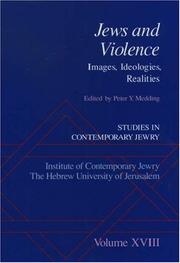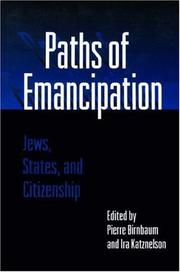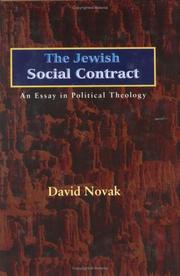| Listing 11 - 19 of 19 | << page >> |
Sort by
|
Book
ISBN: 9780230290129 Year: 2012 Publisher: Basingstoke [etc.] Palgrave Macmillan
Abstract | Keywords | Export | Availability | Bookmark
 Loading...
Loading...Choose an application
- Reference Manager
- EndNote
- RefWorks (Direct export to RefWorks)
Zionism --- Zionism and Judaism. --- Judaism and state. --- Jews --- History. --- Politics and government. --- Buber, Martin, --- Scholem, Gershom, --- Political and social views. --- Zionism and Judaism --- Mythology --- Judaism and state --- State and Judaism --- State, The --- Myths --- Legends --- Religion --- Religions --- Folklore --- Gods --- Myth --- Judaism and Zionism --- Judaism --- History --- Political aspects --- Politics and government --- Political and social conditions

ISBN: 0195160096 9780195160093 1423726936 9781423726937 1433700190 9781433700194 1280560258 0195347781 Year: 2002 Volume: 18 Publisher: New York Oxford University Press
Abstract | Keywords | Export | Availability | Bookmark
 Loading...
Loading...Choose an application
- Reference Manager
- EndNote
- RefWorks (Direct export to RefWorks)
Volume XVIII of 'Studies in Contemporary Jewry' offers a view of Jews and violence. It construes violence broadly, including deviance and crime, verbal threat and incitement, coercion, force and the resort to arms in individual, collective and communal, and state contexts. The essays span events in Israel, Russia, Germany, and the United States.
Jews --- Violence --- Judaism and state --- Social conditions --- History --- Religious aspects --- Judaism. --- Violent behavior --- Social psychology --- State and Judaism --- State, The --- Hebrews --- Israelites --- Jewish people --- Jewry --- Judaic people --- Judaists --- Ethnology --- Religious adherents --- Semites --- Judaism --- Jews - Social conditions - 20th century. --- Violence - History - 20th century. --- Violence - Religious aspects - Judaism. --- Judaism and state - History - 20th century. --- Violence - Israel.


ISBN: 0691034613 0691034605 0691607826 140086397X 9781400863976 Year: 2014 Publisher: Princeton, NJ
Abstract | Keywords | Export | Availability | Bookmark
 Loading...
Loading...Choose an application
- Reference Manager
- EndNote
- RefWorks (Direct export to RefWorks)
Throughout the nineteenth century, legal barriers to Jewish citizenship were lifted in Europe, enabling organized Jewish communities and individuals to alter radically their relationships with the institutions of the Christian West. In this volume, one of the first to offer a comparative overview of the entry of Jews into state and society, eight leading historians analyze the course of emancipation in Holland, Germany, France, England, the United States, and Italy as well as in Turkey and Russia. The goal is to produce a systematic study of the highly diverse paths to emancipation and to explore their different impacts on Jewish identity, dispositions, and patterns of collective action.Jewish emancipation concerned itself primarily with issues of state and citizenship. Would the liberal and republican values of the Enlightenment guide governments in establishing the terms of Jewish citizenship? How would states react to Jews seeking to become citizens and to remain meaningfully Jewish? The authors examine these issues through discussions of the entry of Jews into the military, the judicial system, business, and academic and professional careers, for example, and through discussions of their assertive political activity.In addition to the editors, the contributors are Geoffrey Alderman, Hans Daalder, Werner E. Mosse, Aron Rodrigue, Dan V. Segre, and Michael Stanislawski.Originally published in 1995.The Princeton Legacy Library uses the latest print-on-demand technology to again make available previously out-of-print books from the distinguished backlist of Princeton University Press. These editions preserve the original texts of these important books while presenting them in durable paperback and hardcover editions. The goal of the Princeton Legacy Library is to vastly increase access to the rich scholarly heritage found in the thousands of books published by Princeton University Press since its founding in 1905.
Jodendom en staat --- Judaism and state --- Judaïsme et Etat --- Jews --- Juifs --- Judaisme et Etat --- Emancipation --- Legal status, laws, etc --- Identity --- Droit --- Identité --- Judaism and state. --- Emancipation. --- Legal status, laws, etc. --- Identity. --- Identité --- State and Judaism --- Identity, Jewish --- Jewish identity --- Jewishness --- Jewish refugees --- Law --- Disabilities, Political --- Emancipation of Jews --- Jewish emancipation --- Political disabilities --- Ethnic identity --- Race identity --- State, The --- Jewish law --- Jewish nationalism --- Persecutions --- History --- Jews - Legal status, laws, etc.

ISBN: 0520209419 0520927060 0585273340 0520229118 9780520927063 9780585273341 9780520209411 Year: 1998 Publisher: Berkeley : University of California Press,
Abstract | Keywords | Export | Availability | Bookmark
 Loading...
Loading...Choose an application
- Reference Manager
- EndNote
- RefWorks (Direct export to RefWorks)
As the fiftieth anniversary of Israeli statehood approaches, along with the commemoration of the hundredth anniversary of the World Zionist Organization, the question of what is meant by a "Jewish" state is particularly timely. Alan Dowty takes on that question in a book that is admirable for its clarity and its comprehensive interpretation of the historical roots and contemporary functioning of Israel.Israeli nationhood, democracy, and politics did not unfold in a social or political vacuum, but developed from power-sharing practices in pre-state Jewish communities in Palestine and in Eastern Europe. Dowty elucidates the broad cluster of cultural, historical, and ideological tenets which came to comprise Israel's contemporary political system. He demonstrates that such tenets were not arbitrary but in fact developed logically from Jewish political habits and the circumstances of time. Dowty illustrates how these traditions are balanced with those of ideology and modernization, and he provides an integrated, sophisticated analysis of the Israeli nation's formation and present state.Dowty also proposes thoughtful answers to puzzles regarding the strengths and weaknesses of Israeli democracy in responding to the challenges of communal divisions, religious contention, the country's non-Jewish minority, and accommodation with the Palestinians. The Jewish State will be invaluable for anyone looking for that one book that gives an intelligent overview of both Israel today and of its origins.
Democracy --- Jews --- Judaism and state --- Zionism --- Palestinian Arabs --- Government - Asia --- Government - Non-U.S. --- Law, Politics & Government --- Politics and government. --- Religious aspects --- Judaism. --- Identity. --- History. --- Politics and government --- Judaism --- Identity --- History --- Israel --- Judaism and democracy --- Arab Palestinians --- Arabs --- Arabs in Palestine --- Palestinians --- Zionist movement --- State and Judaism --- Self-government --- Hebrews --- Israelites --- Jewish people --- Jewry --- Judaic people --- Judaists --- Political and social conditions --- Ethnology --- Jewish nationalism --- State, The --- Restoration --- Zionism. --- Palestinian Arabs.

ISBN: 1282157337 9786612157332 1400824397 9781400824397 0691122105 9780691122106 9781282157330 661215733X Year: 2005 Publisher: Princeton (N.J.) Princeton university press
Abstract | Keywords | Export | Availability | Bookmark
 Loading...
Loading...Choose an application
- Reference Manager
- EndNote
- RefWorks (Direct export to RefWorks)
The Jewish Social Contract begins by asking how a traditional Jew can participate politically and socially and in good faith in a modern democratic society, and ends by proposing a broad, inclusive notion of secularity. David Novak takes issue with the view--held by the late philosopher John Rawls and his followers--that citizens of a liberal state must, in effect, check their religion at the door when discussing politics in a public forum. Novak argues that in a "liberal democratic state, members of faith-based communities--such as tradition-minded Jews and Christians--ought to be able to adhere to the broad political framework wholly in terms of their own religious tradition and convictions, and without setting their religion aside in the public sphere. Novak shows how social contracts emerged, rooted in biblical notions of covenant, and how they developed in the rabbinic, medieval, and "modern periods. He offers suggestions as to how Jews today can best negotiate the modern social contract while calling upon non-Jewish allies to aid them in the process. The Jewish Social Contract will prove an enlightening and innovative contribution to the ongoing debate about the role of religion in liberal democracies.
Secularism --- Covenants --- Democracy --- Judaism and politics. --- Social contract --- Judaism and state. --- Ethics --- Irreligion --- Utilitarianism --- Atheism --- Postsecularism --- Secularization (Theology) --- Covenants (Jewish theology) --- Judaism and democracy --- Judaism --- Politics and Judaism --- Political science --- State and Judaism --- State, The --- Political aspects. --- Religious aspects --- Judaism. --- Political aspects --- Judaism and politics --- Judaism and state --- Social compact --- Consensus (Social sciences) --- Sociology --- Sovereignty --- Self-government --- Equality --- Representative government and representation --- Republics --- Agreements --- Religious aspects&delete&
Book
ISBN: 2070354571 9782070354573 Year: 1981 Volume: 457 Publisher: Paris Gallimard
Abstract | Keywords | Export | Availability | Bookmark
 Loading...
Loading...Choose an application
- Reference Manager
- EndNote
- RefWorks (Direct export to RefWorks)
Sociology of religion --- Political sociology --- Judaism --- Religion and politics --- Judaism and state --- Judaïsme --- Religion et politique --- Congresses --- Congrès --- 296*8 --- 296 --- -Judaism and state --- -Religion and politics --- -#SBIB:316.331H383 --- #GOSA:XV.Jod.M --- 327.39 <=924> --- Political science --- Politics, Practical --- Politics and religion --- Religion --- Religions --- State and Judaism --- State, The --- Jews --- Semites --- Judaïsme. Jodendom--?*8 --- Judaïsme. Jodendom --- Geografische spreiding van de godsdiensten: Azië --- Religious aspects --- Political aspects --- Judaïsme --- Congrès --- #SBIB:316.331H383 --- Judaism - Congresses --- Religion and politics - Congresses --- Judaism and state - Congresses
Book
ISBN: 0385261268 Year: 1992 Publisher: Garden City Doubleday
Abstract | Keywords | Export | Availability | Bookmark
 Loading...
Loading...Choose an application
- Reference Manager
- EndNote
- RefWorks (Direct export to RefWorks)
Judaism --- Jewish nationalism. --- Judaism and state. --- Jews --- Church history --- Ethnicity --- Judaïsme --- Nationalisme juif --- Judaisme et Etat --- Juifs --- Eglise --- Ethnicité --- History --- Religious aspects --- Christianity. --- Histoire --- Aspect religieux --- Christianisme --- 933.32 --- 933.33 --- 281.2 --- -Jewish nationalism --- -Judaism --- -Judaism and state --- -Christianity --- Ecclesiastical history --- History, Church --- History, Ecclesiastical --- Christianity --- State and Judaism --- State, The --- Religions --- Semites --- Hebrews --- Israelites --- Jewish people --- Jewry --- Judaic people --- Judaists --- Ethnology --- Religious adherents --- Nationalism --- Ethnic identity --- Group identity --- Cultural fusion --- Multiculturalism --- Cultural pluralism --- Geschiedenis van het Joodse volk: hellenistische tijd--(332-63 v.Chr.) --- Geschiedenis van het Joodse volk: Romeinse tijd I; Masadah; vernieling van deTempel--(63 v.Chr.-70 n.Chr.) --- Apostolische Kerk. Judeo-christianisme:--tot einde 1ste eeuw --- -History --- Religion --- -Geschiedenis van het Joodse volk: hellenistische tijd--(332-63 v.Chr.) --- -933.32 --- 281.2 Apostolische Kerk. Judeo-christianisme:--tot einde 1ste eeuw --- 933.33 Geschiedenis van het Joodse volk: Romeinse tijd I; Masadah; vernieling van deTempel--(63 v.Chr.-70 n.Chr.) --- 933.32 Geschiedenis van het Joodse volk: hellenistische tijd--(332-63 v.Chr.) --- -State and Judaism --- -Nationalism --- Judaïsme --- Ethnicité --- Jewish nationalism --- Judaism and state --- Hellenistic Judaism --- Judaism, Hellenistic --- Apostolic Church --- Church, Apostolic --- Early Christianity --- Early church --- Primitive and early church --- Primitive Christianity --- Fathers of the church --- Great Apostasy (Mormon doctrine) --- Religious aspects&delete& --- Politics and government
Periodical
ISSN: 0792335X Year: 1989 Publisher: Jerusalem, Israel : Jerusalem Center for Public Affairs,
Abstract | Keywords | Export | Availability | Bookmark
 Loading...
Loading...Choose an application
- Reference Manager
- EndNote
- RefWorks (Direct export to RefWorks)
Jews --- Judaism and politics --- Judaism and state --- Politics in the Bible --- Judaism and politics. --- Judaism and state. --- Politics and government --- Politics in the Bible. --- Politieke filosofie. --- Politieke geschiedenis. --- Joden. --- Politics and government. --- Israel --- Israel. --- Arts and Humanities --- History --- Political science --- Political science in the Bible --- Politics, Practical --- State and Judaism --- State, The --- Judaism --- Politics and Judaism --- Hebrews --- Israelites --- Jewish people --- Jewry --- Judaic people --- Judaists --- Ethnology --- Religious adherents --- Semites --- Biblical teaching --- Political aspects --- Zionism --- Dawlat Isrāʼīl --- Država Izrael --- Dzi︠a︡rz︠h︡ava Izrailʹ --- Gosudarstvo Izrailʹ --- I-se-lieh --- Israele --- Isrāʼīl --- Isŭrael --- Isuraeru --- Izrael --- Izrailʹ --- Medinat Israel --- Medinat Yiśraʼel --- Stát Izrael --- State of Israel --- Yiselie --- Yiśraʼel --- Middle East --- Dzi͡arz͡hava Izrailʹ --- Jews. --- Political philosophy. --- Political history.
Book

ISBN: 9783451023033 3451023032 9783451823039 Year: 2019 Volume: 303 Publisher: Freiburg im Breisgau Herder
Abstract | Keywords | Export | Availability | Bookmark
 Loading...
Loading...Choose an application
- Reference Manager
- EndNote
- RefWorks (Direct export to RefWorks)
"Dem Staat, den Kirchen und anderen Religionsgemeinschaften ist es ein Anliegen, als je eigenständige Größen der Gesellschaft zu deren Gemeinwohl beitragen. Will der Staat seine weltanschauliche Neutralität wahren, darf er sich nicht mit einer Religionsgemeinschaft identifizieren. Diese Zurückhaltung sollte jedoch nicht mit Indifferenz verwechselt werden. Zudem werden viele gewachsene Standards des Verhältnisses zwischen dem Staat und den christlichen Kirchen immer wieder auf ihre Plausibilität hin befragt und bedürfen einer ständigen Prüfung auch und gerade mit Blick auf den staatsreligionsrechtlichen Status des Islam. Die in Band 303 der Reihe Quaestiones disputatae versammelten Beiträge widmen sich schlaglichtartig aus verschiedenen - christlich-theologischen, jüdisch-theologisch, islamisch-theologischen und staatsreligionsrechtlichen - Perspektiven diesem Beziehungsgeflecht von Staat und Religion und fragen: Wie viel Religion verträgt der Staat? Wie viel Staat verträgt die Religion? Ja vertragen sie sich?"--
Religion and state --- Church and state --- Judaism and state --- Islam and state --- Religious pluralism --- Freedom of religion --- 241.62*5 --- 261.7 --- Freedom of worship --- Intolerance --- Liberty of religion --- Religious freedom --- Religious liberty --- Separation of church and state --- Freedom of expression --- Liberty --- Pluralism (Religion) --- Pluralism --- Religion --- Religions --- State and religion --- State, The --- Mosque and state --- State and Islam --- Ummah (Islam) --- State and Judaism --- Christianity and state --- State and church --- 261.7 De Kerk en de burgerlijke macht: Kerk en Staat; godsdienstvrijheid; verdraagzaamheid; tolerantie:--theologische aspecten --- De Kerk en de burgerlijke macht: Kerk en Staat; godsdienstvrijheid; verdraagzaamheid; tolerantie:--theologische aspecten --- 241.62*5 Theologische ethiek: verhouding Kerk en Staat --- Theologische ethiek: verhouding Kerk en Staat --- History --- Law and legislation --- Religious aspects
| Listing 11 - 19 of 19 | << page >> |
Sort by
|

 Search
Search Feedback
Feedback About UniCat
About UniCat  Help
Help News
News